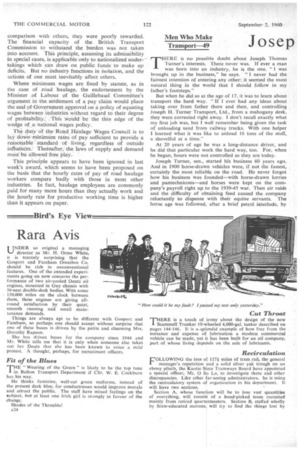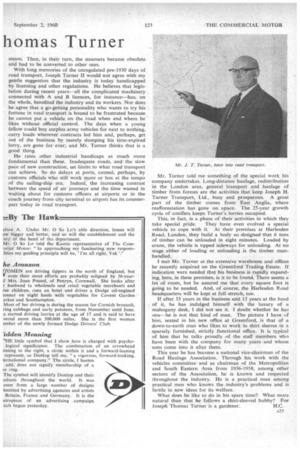Men Who Make Transport-49
Page 26

Page 27

If you've noticed an error in this article please click here to report it so we can fix it.
Josep homas Turner
HERE is no possible doubt about Joseph Thomas Turner's interests. There never was. If ever a man was born into an industry, he is the one. "I was brought up in the business," he says. "I never had the faintest intention of entering any other: it seemed the most natural thing in the world that I should follow in my father's footsteps."
But when he did so at the age of 17, it was to learn about transport the hard way. "If I ever had any ideas about taking over from father there and then, and controlling Joseph H. Turner Transport, Ltd., from a mahogany desk, they were corrected right away. I don't recall exactly what my first job was, but I well remember being given the task of unloading sand from railway trucks. With one helper I learned what it was like to unload 16 tons of the stuff, a shovelful at a time."
At 20 years of age he was a long-distance driver, and he did that particular work the hard way, too. For, when he began, hours were not controlled as they are today.
Joseph Turner, sen., started his business 60 years ago. And in 1900 horse-drawn vehicles were, if not the fastest, certainly the most reliable on the road. He never forgot how his business was founded—with horse-drawn lorries and pantechnicons—and horses were kept on the company's payroll right up to the 1939-45 war. Then air raids and the difficulty of obtaining feed caused the company reluctantly to dispense with their equine servants. The horse age was followed, after a brief petrol interlude, by
steam. Then, in their turn, the steamers became obsolete and had to be converted to other uses.
With long memories of the unregulated pre-1930 days of road transport, Joseph Turner II would not agree with my gentle suggestion that the industry is today handicapped by licensing and other regulations. He believes that legislation during recent years—all the complicated machinery connected with A and B licences, for instance—has, on the whole, benefited the industry and its workers. Nor does he agree that a go-getting personality who wants to try his fortune in road transport is bound to be frustrated because he cannot put a vehicle on the road when and where he likes without official control. The days when a young fellow could buy surplus army vehicles for next to nothing, carry loads wherever contracts led him and, perhaps, get out of the business by merely dumping his time-expired lorry, are gone for ever; and Mr. Turner thinks that is a good thing.
He rates other industrial handicaps as much more fundamental than these. Inadequate roads, and the slow pace of new construction, set limits to what road transport can achieve. So do delays at ports, caused, perhaps, by customs officials who still work more or less at the tempo of the sailing-ship era. Indeed, the increasing contrast between the speed of air journeys and the time wasted in waiting about for customs officers at airports or in the coach journey from city terminal to airport has its counterpart today in road transport. Mr. Turner told me something of the special work his company undertakes. Long-distance haulage, redistribution in the London area, general transport and haulage of timber from forests are the activities that keep Joseph H. Turner Transport, Ltd., busy and prosperous. A great part of the timber comes from East Anglia, where reafforestation has gone on apace. The 25-year growth cycle of conifers keeps Turner's lorries occupied.
This, in fact, is a phase of their activities in which they take special pride. They have even evolved a special vehicle to cope with it. At their premises at Harlesden Road, London, they build a body so designedthat 6 tons of timber can be unloaded in eight minutes. Loaded by crane, the vehicle is tipped Sideways for unloading. At no stage either of loading or unloading is the timber manhandled. .
I met Mr. Turner at the extensive warehouse and offices he recently acquired on the Greenford Trading Estate. If indication were needed that his business is rapidly expanding, here, in these premises, is it to be found. There seems a lot of room, but he assured me that every square foot is going to be needed. And, of course, the Harlesden Road headquarters will be kept at full stretch, too.
If after 33 years in the business and 15 years at the head of it, he has indulged himself with the luxury of a mahogany desk, I did not see it. I doubt whether he has one—he is not that kind of man. The picture I have of him, seated in his new office at Greenford, is that of a down-to-earth man who likes to work in shirt sleeves in a sparsely furnished, strictly functional office. It is typical of him that he talks proudly of the staff members who have been with the company for many years and whose sons come into it after them.
This year he has become a national vice-chairman of the Road Haulage Association. Through his work with the vehicles committee and as chairman of the Metropolitan and South Eastern Area from 1956-1958, among other sectors of the Association, he is known and respected . throughout the industry. He is a practical man among practical men who knows the industry's problems and is fertile in new ideas for its welfare.
What does he like to do in his spare time? What more natural than that he follows a shirt-sleeved hobby? For Joseph Thomas Turner is a gardener. H.C.








































































































